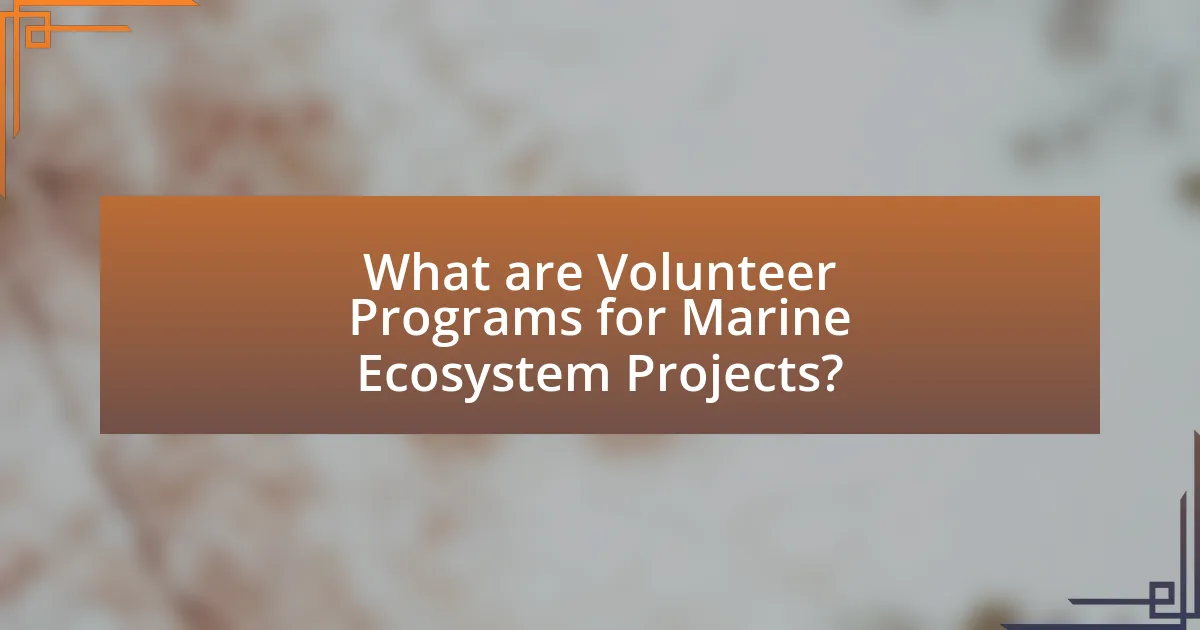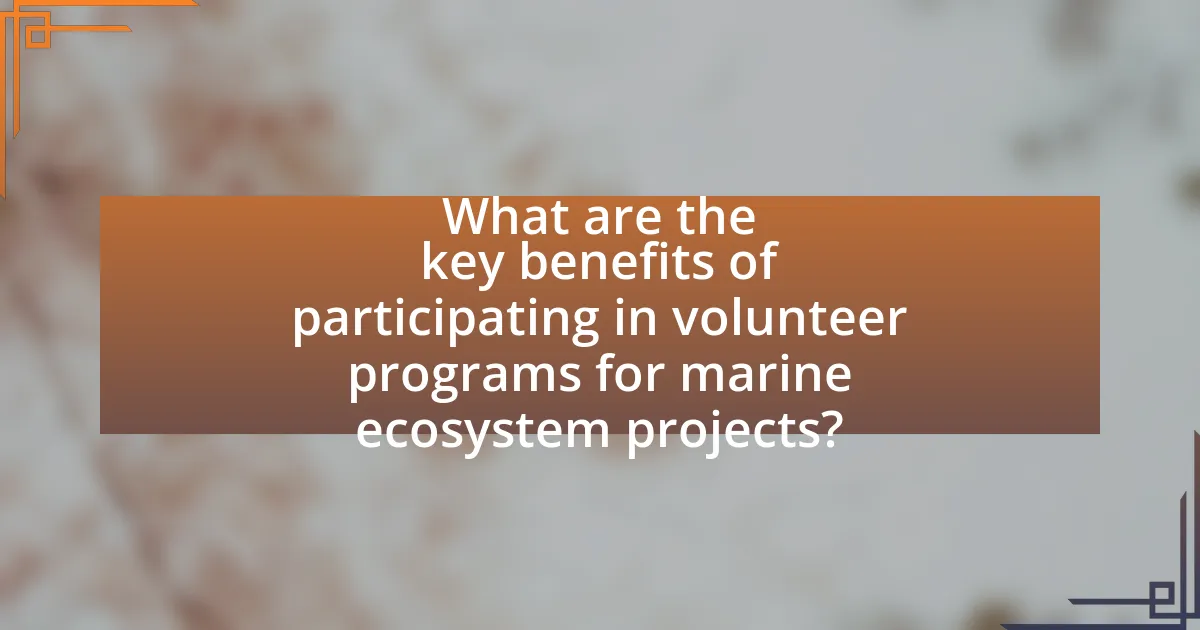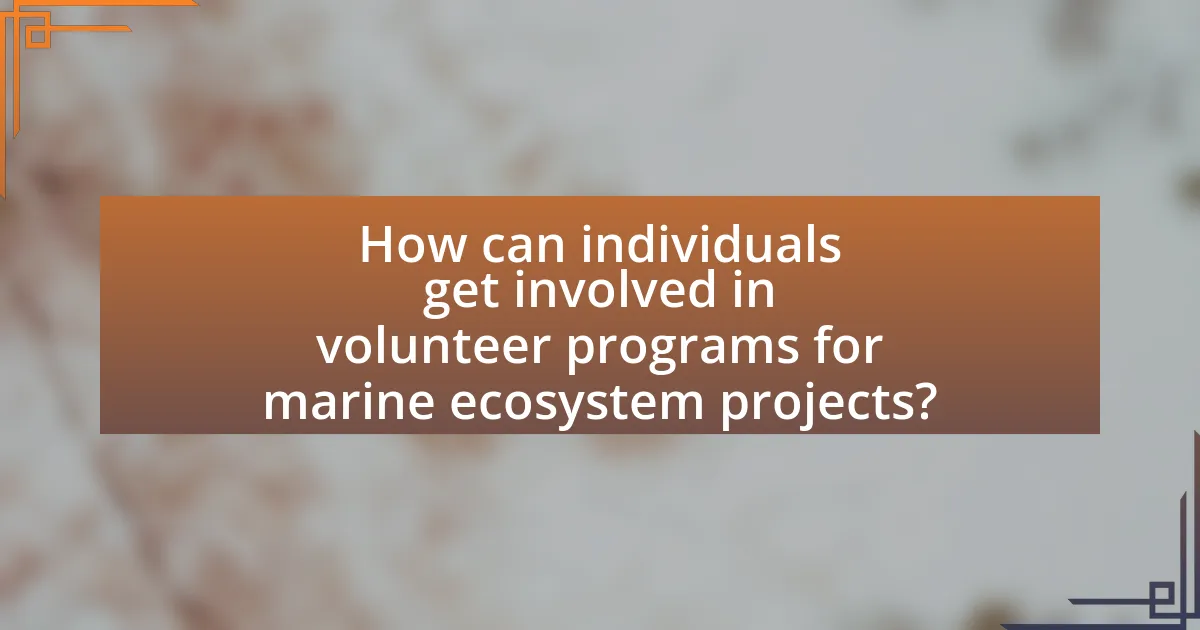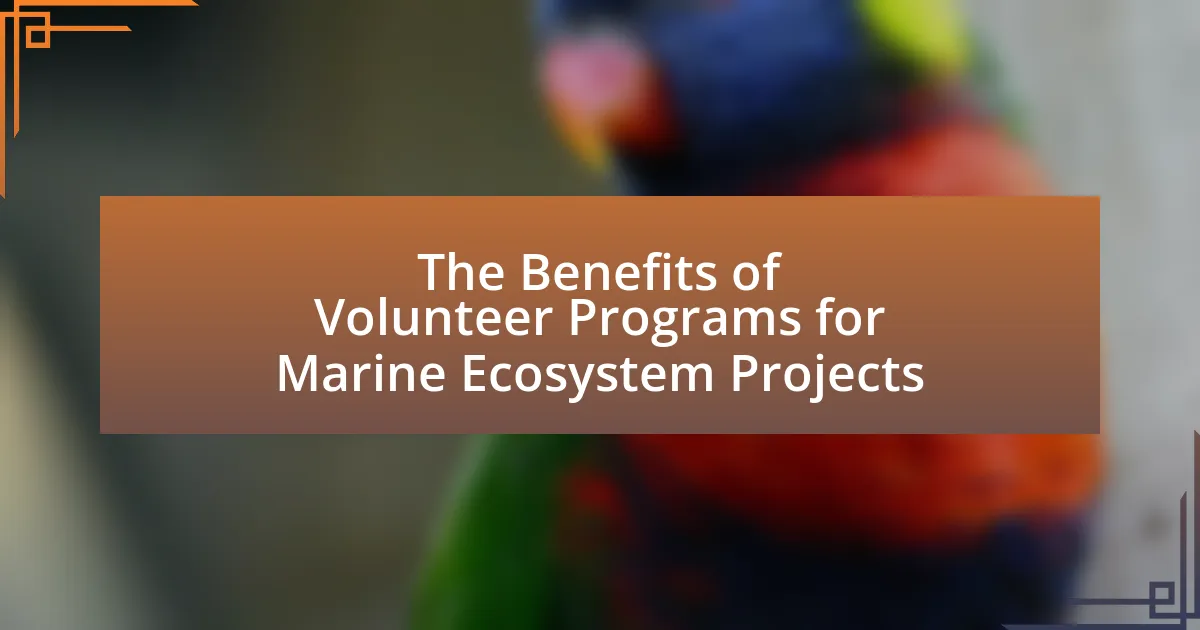Volunteer programs for marine ecosystem projects are initiatives that engage individuals in conservation efforts aimed at protecting and restoring marine environments. These programs involve activities such as coral reef monitoring, beach clean-ups, and marine wildlife surveys, contributing to the health of ocean ecosystems while enhancing public awareness and providing critical data for scientific studies. Volunteers typically participate in roles like data collection, habitat restoration, and educational outreach, which are essential for successful conservation efforts. The article outlines the operational aspects of these programs, the benefits of participation, and the significant environmental and community impacts resulting from volunteer involvement in marine conservation.

What are Volunteer Programs for Marine Ecosystem Projects?
Volunteer programs for marine ecosystem projects are initiatives that engage individuals in conservation efforts aimed at protecting and restoring marine environments. These programs often involve activities such as coral reef monitoring, beach clean-ups, and marine wildlife surveys, allowing volunteers to contribute directly to the health of ocean ecosystems. Research indicates that such programs not only enhance public awareness about marine conservation but also provide critical data for scientific studies, thereby supporting biodiversity and ecosystem resilience.
How do these volunteer programs operate?
Volunteer programs for marine ecosystem projects operate by recruiting individuals to participate in hands-on conservation activities, such as habitat restoration, species monitoring, and educational outreach. These programs typically involve structured training sessions that equip volunteers with the necessary skills and knowledge to contribute effectively. For instance, volunteers may engage in coral reef surveys, where they collect data on coral health and biodiversity, which is crucial for assessing ecosystem status.
Additionally, many programs collaborate with local organizations and researchers to ensure that volunteer efforts align with scientific goals and conservation strategies. This collaboration enhances the impact of the volunteers’ work, as evidenced by studies showing that community involvement in marine conservation leads to improved ecological outcomes. For example, a report by the National Oceanic and Atmospheric Administration highlights that volunteer-led initiatives have successfully restored over 1,000 acres of coastal habitats in the past decade.
What roles do volunteers typically take on in these programs?
Volunteers in marine ecosystem programs typically take on roles such as data collection, habitat restoration, education and outreach, and monitoring wildlife. These roles are essential for the success of conservation efforts, as volunteers assist in gathering critical data that informs research and management decisions, participate in hands-on activities to restore habitats like coral reefs and mangroves, engage the community through educational initiatives, and help track the health of marine species. For instance, a study by the National Oceanic and Atmospheric Administration (NOAA) highlights that volunteer involvement in data collection significantly enhances the quality and quantity of information available for marine conservation efforts.
What types of marine ecosystem projects are commonly involved?
Marine ecosystem projects commonly involved include coral reef restoration, mangrove reforestation, marine protected area establishment, and habitat monitoring. These projects aim to enhance biodiversity, improve ecosystem health, and promote sustainable practices. For instance, coral reef restoration projects often utilize techniques such as coral gardening and transplantation to rehabilitate damaged reefs, which are critical for marine life and coastal protection. Mangrove reforestation initiatives focus on restoring coastal ecosystems that provide essential services like carbon sequestration and shoreline stabilization. Establishing marine protected areas helps conserve critical habitats and species, while habitat monitoring projects assess the health of marine environments, providing data necessary for effective management and conservation strategies.
Why are volunteer programs important for marine ecosystems?
Volunteer programs are important for marine ecosystems because they engage individuals in conservation efforts that directly contribute to the health and sustainability of marine environments. These programs mobilize community action, leading to activities such as beach clean-ups, coral reef restoration, and species monitoring, which help mitigate the impacts of pollution, habitat destruction, and climate change. For instance, a study by the National Oceanic and Atmospheric Administration (NOAA) found that volunteer-led initiatives can significantly reduce marine debris, improving habitat quality for marine life. Additionally, volunteers often raise awareness and educate others about marine conservation, fostering a culture of stewardship that is essential for long-term ecological health.
How do these programs contribute to conservation efforts?
Volunteer programs for marine ecosystem projects contribute to conservation efforts by actively engaging individuals in hands-on activities that restore and protect marine habitats. These programs often involve tasks such as coral reef restoration, beach clean-ups, and data collection on marine biodiversity, which directly enhance the health of marine ecosystems. For instance, a study published in the journal “Conservation Biology” found that volunteer-led coral restoration initiatives can increase coral cover by up to 50% in targeted areas, demonstrating the tangible impact of these programs on marine conservation.
What impact do volunteers have on local communities and ecosystems?
Volunteers significantly enhance local communities and ecosystems by providing essential labor and resources for conservation efforts. Their involvement in marine ecosystem projects leads to improved biodiversity, as they participate in activities such as habitat restoration, species monitoring, and pollution cleanup. For instance, a study published in the journal “Ecological Applications” found that volunteer-led initiatives in coastal areas resulted in a 30% increase in native species populations over five years. Additionally, volunteers foster community engagement and awareness about environmental issues, which can lead to sustainable practices and policies. This dual impact on ecological health and community involvement underscores the vital role volunteers play in promoting both environmental and social well-being.

What are the key benefits of participating in volunteer programs for marine ecosystem projects?
Participating in volunteer programs for marine ecosystem projects offers significant benefits, including environmental impact, skill development, and community engagement. Volunteers contribute to the conservation and restoration of marine habitats, which is crucial given that over 30% of marine species are threatened due to human activities. This hands-on involvement allows individuals to gain practical skills in marine biology, conservation techniques, and teamwork. Additionally, these programs foster a sense of community and awareness about marine issues, encouraging participants to advocate for sustainable practices. Studies show that volunteer engagement in environmental projects can lead to increased public support for conservation initiatives, highlighting the broader societal benefits of such programs.
How do volunteers benefit personally from these programs?
Volunteers benefit personally from marine ecosystem programs by gaining valuable skills and experiences that enhance their personal and professional development. These programs often provide training in marine biology, conservation techniques, and teamwork, which can improve employability in related fields. Research indicates that 70% of volunteers report increased confidence and a sense of purpose after participating in such initiatives, as they contribute to meaningful environmental change. Additionally, volunteers often form lasting connections with like-minded individuals, fostering a sense of community and belonging, which further enriches their personal lives.
What skills can volunteers gain through their participation?
Volunteers can gain a variety of skills through their participation in marine ecosystem projects, including teamwork, communication, problem-solving, and technical skills related to marine biology and conservation. Teamwork is developed as volunteers collaborate with diverse groups to achieve common goals, while communication skills are enhanced through interactions with team members and stakeholders. Problem-solving abilities are sharpened as volunteers address challenges encountered during projects. Additionally, technical skills such as data collection, species identification, and environmental monitoring are acquired, which are essential for effective marine conservation efforts. These skills not only contribute to personal development but also enhance employability in environmental fields.
How does volunteering enhance personal growth and awareness?
Volunteering enhances personal growth and awareness by providing individuals with opportunities to develop new skills, gain diverse perspectives, and foster a sense of community. Engaging in volunteer work, particularly in marine ecosystem projects, allows volunteers to learn about environmental issues, teamwork, and leadership, which contribute to their personal development. Research from the Corporation for National and Community Service indicates that volunteers report higher levels of life satisfaction and self-esteem, demonstrating the positive impact of volunteering on personal growth. Additionally, exposure to different cultures and communities through volunteer work increases awareness of social and environmental challenges, promoting empathy and a broader worldview.
What are the environmental benefits of these volunteer programs?
Volunteer programs for marine ecosystem projects provide significant environmental benefits, including habitat restoration, biodiversity enhancement, and pollution reduction. These programs often involve activities such as planting seagrass, which can improve water quality and provide critical habitats for marine life. Research indicates that seagrass meadows can sequester carbon at rates up to 83,000 kilograms per hectare annually, contributing to climate change mitigation. Additionally, volunteers help remove marine debris, which protects wildlife and reduces the risk of entanglement and ingestion by marine animals. Studies show that organized clean-up efforts can lead to a 50% reduction in marine litter in targeted areas, demonstrating the effectiveness of these initiatives. Overall, these volunteer programs play a crucial role in promoting healthier marine ecosystems.
How do volunteer efforts lead to improved marine biodiversity?
Volunteer efforts lead to improved marine biodiversity by actively engaging individuals in conservation activities that restore habitats and protect marine species. These initiatives often include beach clean-ups, coral reef restoration, and monitoring of marine life, which directly contribute to healthier ecosystems. For instance, a study published in the journal “Marine Policy” found that community-led conservation projects significantly increased fish populations and biodiversity in targeted areas, demonstrating the effectiveness of volunteer involvement in marine ecosystem health.
What specific conservation outcomes can be attributed to volunteer programs?
Volunteer programs contribute to specific conservation outcomes such as habitat restoration, species monitoring, and community engagement. These programs often involve activities like planting native vegetation, which can lead to improved biodiversity and ecosystem health. For instance, a study published in the journal “Conservation Biology” found that volunteer-led restoration projects in coastal areas resulted in a 30% increase in native plant species over three years. Additionally, volunteers frequently assist in monitoring endangered species, providing critical data that informs conservation strategies. This active participation fosters a sense of stewardship within local communities, enhancing public awareness and support for marine conservation efforts.

How can individuals get involved in volunteer programs for marine ecosystem projects?
Individuals can get involved in volunteer programs for marine ecosystem projects by researching local and international organizations that focus on marine conservation, such as Ocean Conservancy or the Coral Triangle Initiative. These organizations often provide opportunities for volunteers to participate in activities like beach clean-ups, coral reef restoration, and wildlife monitoring. Many programs require volunteers to sign up through their websites, where they can find information on upcoming projects, training sessions, and application processes. Engaging in these programs not only contributes to marine conservation efforts but also enhances individual knowledge and skills related to marine ecosystems.
What steps should one take to find suitable volunteer opportunities?
To find suitable volunteer opportunities, one should first identify personal interests and skills relevant to marine ecosystem projects. This involves researching organizations focused on marine conservation, such as Oceana or the Ocean Conservancy, which often list volunteer roles on their websites. Next, individuals can utilize platforms like VolunteerMatch or Idealist to search for specific opportunities that align with their interests. Additionally, attending local environmental events or workshops can provide networking opportunities and insights into available volunteer positions. According to a 2021 survey by the Corporation for National and Community Service, 63 million Americans volunteered, indicating a strong community interest in volunteerism, which can enhance the search for suitable roles.
What factors should be considered when choosing a program?
When choosing a program for marine ecosystem projects, factors such as the program’s objectives, location, duration, and support services should be considered. The program’s objectives must align with personal goals and the specific needs of marine conservation efforts, ensuring that volunteers contribute effectively. The location is crucial, as it should provide access to diverse marine environments and ecosystems that require attention. Duration impacts the depth of involvement and learning opportunities, with longer programs often offering more comprehensive experiences. Support services, including training, accommodation, and mentorship, enhance the volunteer experience and ensure safety and effectiveness in project execution. These factors collectively influence the overall impact and satisfaction derived from participating in marine ecosystem volunteer programs.
How can volunteers prepare for their roles effectively?
Volunteers can prepare for their roles effectively by engaging in thorough training and familiarizing themselves with the specific requirements of the marine ecosystem projects they will be involved in. This preparation often includes attending orientation sessions, studying relevant materials about marine biology and conservation practices, and understanding the goals and methodologies of the project. Research indicates that well-prepared volunteers are more likely to contribute positively to project outcomes, as they possess the necessary knowledge and skills to perform their tasks efficiently. For instance, a study published in the Journal of Environmental Management highlights that volunteers who undergo structured training programs demonstrate a 30% increase in task performance compared to those who do not receive such preparation.
What are some best practices for successful volunteering in marine ecosystem projects?
Successful volunteering in marine ecosystem projects involves several best practices. First, volunteers should undergo proper training to understand marine biology and conservation techniques, which enhances their effectiveness. Research indicates that trained volunteers contribute significantly to project outcomes, as seen in studies by the National Oceanic and Atmospheric Administration, which highlight the importance of education in conservation efforts.
Second, volunteers must engage in teamwork and collaboration, as many marine projects require diverse skills and perspectives. Effective communication among team members leads to better problem-solving and project execution.
Third, maintaining a commitment to sustainability is crucial. Volunteers should adhere to eco-friendly practices, such as minimizing waste and respecting wildlife habitats, which aligns with the principles of marine conservation.
Lastly, volunteers should regularly evaluate their impact and seek feedback to improve their contributions. Continuous assessment helps in adapting strategies to meet project goals effectively.
How can volunteers maximize their impact during their service?
Volunteers can maximize their impact during their service by actively engaging in training and education related to marine ecosystems. This involvement enhances their understanding of ecological principles and effective conservation strategies, leading to more informed actions. Research indicates that well-informed volunteers contribute significantly to project outcomes; for instance, a study published in the Journal of Environmental Management found that trained volunteers improved data collection accuracy by 30%, directly benefiting marine conservation efforts. By prioritizing skill development and knowledge acquisition, volunteers can ensure their contributions are both effective and sustainable.
What common challenges do volunteers face, and how can they overcome them?
Volunteers commonly face challenges such as time constraints, lack of training, and emotional fatigue. To overcome time constraints, volunteers can establish a flexible schedule that accommodates their commitments, allowing them to participate without feeling overwhelmed. Addressing the lack of training can be achieved through organized orientation sessions and ongoing support from experienced team members, ensuring volunteers feel equipped to contribute effectively. Emotional fatigue can be mitigated by promoting a supportive community among volunteers, encouraging open communication, and providing opportunities for self-care and reflection, which helps maintain motivation and engagement in marine ecosystem projects.
